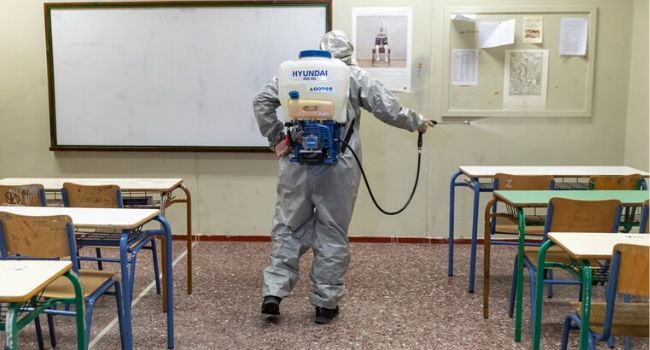
Does ‘Deep Cleaning’ Schools Help Prevent Coronavirus Spread? Experts Debate
While schools want to take action to keep students and staff safe from contracting COVID-19, public health officials say there is very little evidence that the virus is spread through contaminated surfaces.
- By Haley Samsel
- March 17, 2020
As schools and universities face widespread, long-term closures for the next few weeks due to the coronavirus epidemic, administrators face decisions about if, when and how to “deep clean” facilities to prevent further student and staff exposure to the virus.
But, before all those closures took place, The Washington Post asked public health experts to weigh in on how effective deep cleaning would be in limiting the spread of COVID-19.
Before Delaware Gov. John Carney declared all of the state’s schools closed from March 16 to March 27, the Laurel School District had already closed campuses for two days to “deep clean” its schools. That decision was made after a staff member disclosed that they had contact with someone who had recently traveled to a country with an outbreak. Despite the traveler and the staff member not having symptoms, Laurel decided to close, according to the Post.
The decision by Laurel and other districts sparked debate over how schools should react to the pandemic. Deep cleaning typically includes disinfecting all surfaces across the building so that heavily trafficked areas, such as desks and hallways, can be the sole focus of regular cleaning. But Marcus Plescia, the chief medical officer of the Association of State and Territorial Health Officials, told the Post that these efforts could be wasting time and money.
“It makes people feel better that there is this thorough cleaning done, but how effective it is, we don’t know,” Plescia said.
He added that there is an ongoing debate among health officials about how long the coronavirus lives on hard surfaces.
“Most of us think not very long,” Plescia said. “It thrives on people’s bodies, not out in the open on a hard service. It’s not clear, so the uncertainty may be what is moving to have schools deep clean.”
One new study, released late last week, indicates that the virus can survive on "hard surfaces such as plastic and stainless steel for up to 72 hours and on cardboard for up to 24 hours," NPR reported. However, the Centers for Disease Control and Prevention has said that "transmission of novel coronavirus to persons from surfaces contaminated with the virus has not been documented." Instead, COVID-19 is often spread from person-to-person contact or breathing in the virus.
Michael T. Osterhold, who directs the Center for Infectious Disease Research and Policy at the University of Minnesota, told the Post that there is “no evidence” that people contract the virus from touching a contaminated surface. The cleanings are motivated by a common desire to take action in the wake of confusion over how the virus works, he said.
“All this activity you see on TV with people in Asia spraying down streets and cars is all for show and making people feel like they are doing something,” Osterhold said. “I can’t even say closing down schools to clean them will make a difference. The data isn’t there.”
Public health officials advise people young and old to wash their hands frequently with soap and water, which is the most effective way of killing the virus before they transmit it through their mouth or nose. (Children who have been diagnosed with COVID-19 have largely shown mild symptoms, and adults make up the overwhelming majority of cases).
About the Author
Haley Samsel is an Associate Content Editor for the Infrastructure Solutions Group at 1105 Media.